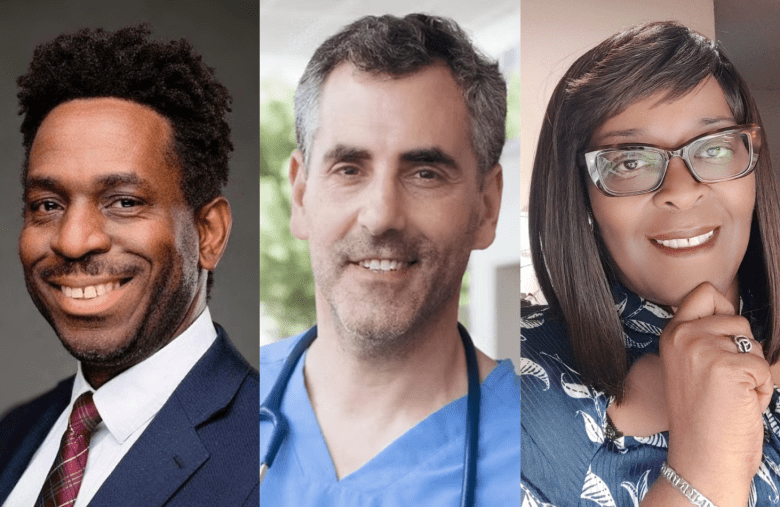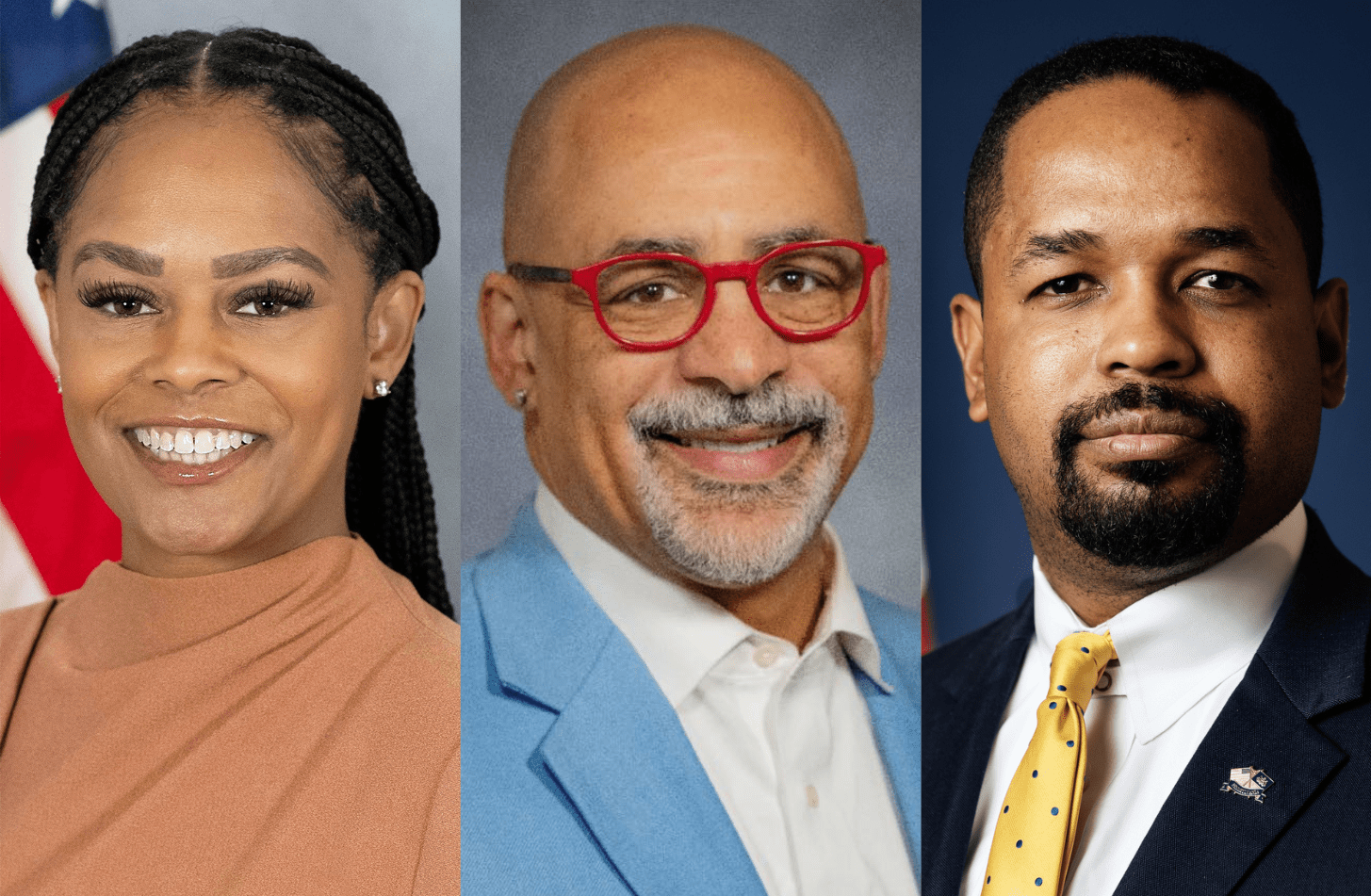U.S. Rep. Dwight Evans’ decision not to run for reelection has created a rare opening for the prized job of representing about half of Philadelphia in Congress, and spurred a lively race to succeed him.
Ahead of next May’s Democratic primary, three state legislators, a Jefferson Health doctor, a Temple University computer science professor and two other political newcomers have entered the contest, and more candidates could still jump in.
Pennsylvania’s 3rd Congressional District covers West Philadelphia, parts of North Philadelphia, and much of Center City, and is rated the most Democratic district in the country, with a “+40 D” rating from the Cook Political Report. Its voters went 88%-11% for Kamala Harris last year and 92%-6% for Gov. Josh Shapiro in 2022.
In such a left-leaning district, the candidates are bound to have similar views and priorities, and policy differences won’t make much difference in the primary outcome, local political consultants say. Since the 3rd is clearly not a swing district, it also probably won’t attract significant spending by national political funders or interest groups that could push one candidate to the top.
Fundraising will still be very important as the contenders work to increase their name recognition through pricey TV commercials and mass mail campaigns, the experts add. But among those who do raise enough, the decisive factor may be what Philadelphia political consultant Dan Fee called the candidate’s “identification” — a main attribute each is known for, and the group of voters that appeals to.
“If you’re a Black woman and you want to vote for a Black woman, you’re going to vote for [that candidate] whether they have enough money or not. If you are someone who believes that health care is the most important issue, you’re going to vote for the doctor,” he said.
“Having been on both the winning and losing side of the candidates with the most money, sometimes other things matter more,” Fee said. “I think that this is a race where other things will matter more.”
U.S. Rep. Brendan Boyle, whose 2nd Congressional District covers most of the other half of Philadelphia, said victory will be determined by a complex combination of factors, including who runs a disciplined and vigorous campaign.
“Yes, ideology is a factor, but in a multi-candidate primary, especially in Philadelphia, geography is a factor, identity is a factor,” he said. “What will matter most in this district is not ideology or what kind of flavor of Democrat you are. I think it’ll be simply as old-fashioned as who runs the best race.”
Experienced pols seek to move up
No poll results have been publicly released and the primary is still nine months away, but some observers say that the strongest candidate right now is probably state Sen. Sharif Street.
He’s already known to many of his 260,000 constituents and was chair of the state Democratic party until he resigned last month. He shares a famous name with his father, former two-term mayor John Street, and his late uncle Milton Street, who served in the Pa. House and Senate.
Street was also quick out of the gate, declaring his candidacy days after Evans announced his retirement at the end of June, announcing early union endorsements and holding fundraising events.
“He’s got great name recognition, and so far has seemed to have party support coalesce around his campaign in terms of labor support and other people that are involved in the process,” said Mustafa Rasheed, president and CEO of government relations firm Bellevue Strategies.
Street was soon followed by state Rep. Chris Rabb, who since 2017 has represented a Northwest Philadelphia district with high voter turnout rates and a history of strong political organization. He’s known as an outspoken progressive who’s proposed bills on criminal justice reform and reparations for Black residents, and has repeatedly won races without official party backing.
A “disproportionate” part of the 3rd Congressional District is in the Northwest, “so the Northwest will have its say on who they want to see for this. That’s going to play a huge role,” Rasheed said. Rabb has “a good power base of support there.”
“Chris has been against the establishment candidate a few cycles, but, you know, you win a few times, and now you’re the establishment yourself,” he added.
This week state Rep. Morgan Cephas, who has represented West Philadelphia since 2016, launched her campaign. She touts her work boosting maternal health benefits for Medicaid recipients and winning state funding for community development projects, and notes she would be the first Black woman representing Philadelphia in Congress.
“If Cephas raises a lot of money and can project the fact that she’s the most prominent female [candidate], I would guess that she has a chance to make some noise,” said longtime political consultant Neil Oxman of the Campaign Group.
Cephas’ run follows successful campaigns by former state rep Cherelle Parker, who last year became Philly’s first woman mayor; Rep. Joanna McClinton, the first Black woman to serve as Pa. House Speaker; and U.S. Rep. Summer Lee, a former state representative from the Pittsburgh area who in 2022 became the first Black woman elected to represent the state in Congress.
“Pennsylvania’s delegation has made great strides in the last half dozen years or so in women stepping up and running fantastic campaigns and winning,” Rasheed said.
Newcomers working to be heard
The first-timers in the race include David Oxman, an intensive care doctor at Jefferson. (He is not related to Neil Oxman.) He’s focusing on the inadequacy of the healthcare system and this week attacked U.S. Secretary of Health and Human Services Robert F. Kennedy Jr.’s statements about vaccines, calling him “the most wholly unqualified charlatan to ever hold the position” and saying he should be impeached.
While several candidates are soliciting contributions, Oxman’s the only one who has reported significant fundraising so far. He’s raised $280,000, including $100,000 he personally loaned his campaign.
 From left, Karl Morris, Dave Oxman and Robin Toldens are running in the Democratic primary for Pennsylvania’s 3rd Congressional District.
From left, Karl Morris, Dave Oxman and Robin Toldens are running in the Democratic primary for Pennsylvania’s 3rd Congressional District.
Rasheed said that’s a “significant amount” for someone who’s never run before, and shows the physician has a “decent network,” while adding that newbie candidates tend to hit a wall financially after maxing out their friends and family.
Neil Oxman, the political consultant, was not impressed. “$280,000 is, you know, five days of Philadelphia television. It’s not going to get the guy a lot of stuff. You and I can raise 200,000 bucks from our friends,” he said.
Temple University computer science professor Karl Morris is running a campaign that emphasizes equal access to AI and other technology and protections from their misuse, and focuses on women’s health, climate change, home affordability and other Democratic priorities.
Another first-time candidate is Robin Toldens, a real estate agent and former city employee who worked on billing and invoicing systems for the Water Department and for other city programs.
The Federal Election Commission’s campaign finance website also lists a candidate named Gabriel Caceres. No further information about him was available.
State Rep. Malcolm Kenyatta has a national profile, unlike most of his colleagues, and is often mentioned as a potential congressional candidate. He’s run for U.S. Senate and state Auditor General, and “obviously doesn’t want to be a state rep any more,” Oxman said. But he hasn’t made any moves to run, and Oxman said it may make more sense for Kenyatta to see if Street wins and then make a bid to succeed him in the Pennsylvania House.
Starting with the base
With at least seven people in the race, multiple viable contenders, and no clear frontrunner, the candidates could substantially divide the vote and one could win with as little as 20% or 30% of the votes cast, Fee and others said.
Over the past decade, the highest turnout in the 3rd District primary was about 179,000 in 2016, a presidential election year when Evans ousted incumbent Chaka Fattah. It’s usually much lower. That suggests someone could win in May with 30,000 or fewer votes.
One way to look at the candidates’ task is that they have to firm up their existing base and then pick up enough little bits of additional support, here and there. Boyle, who was elected to Congress in 2014 after winning a multi-candidate primary, said he succeeded by working hard to pin down those crucial extra votes.
“I was getting 75% of the vote in a certain segment of the congressional district,” said Boyle, who was a state representative at the time. “Now, that wasn’t enough for me to win, but then I was able to focus on communicating my message to the other roughly 70, 75% or so of the congressional district who just really had never heard of me, didn’t know who I was.”
He had a “very clear message” focused on economic concerns that was very different from the social-issue campaigns some of his opponents were running, he said. “It really helps to have a base, and then adding on to that, a clear rationale for why you’re running and what you’re going to focus on,” he said.
He won with close to 25,000 votes, or 41% of the 61,000 cast.
Boyle noted that he raised the least money among the primary candidates, but it was enough to get him the exposure he needed.
“Had I not raised a certain threshold in order to be on television and be in the mailboxes and fund some of the other things we needed to fund, then I wouldn’t have been able to win,” he said. “So money matters, but once you reach a critical threshold, it becomes about other things, and the money matters a lot less.”
Money as a wildcard
Still, the candidates need to reach that threshold. Rasheed maintained the campaigns will have to raise at least $1.5 million each to get on television next spring and cover their other costs, if they are to remain viable.
If there ends up being a big disparity — if one campaign somehow raises, say, $4 to $5 million, and the others much less — that could change the dynamics of the race, Oxman said
For example, he said he was skeptical Rabb has enough name recognition and base support to win, unless perhaps he can galvanize enough former supporters of Sen. Bernie Sanders’ presidential run and its successor progressive movements — and raises a ton of money.
“Let’s say he goes and raises millions of dollars and runs an unbelievable campaign. That makes a difference,” he said.
Another big question is whether the prospect of a Cephas win motivates national funders to start independently buying ads urging voters to support her.
“Does Emily’s List, and all these women’s groups that really have been pushing very successfully for women to win public office — do they get behind her in a big way, and can she raise a lot of independent expenditure money? There’s that other wild card out there that can upset the balance of an election,” Oxman said.
Despite uncertainty over how much attention the 3rd District contest will garner, Boyle described it as “an exciting, open race,” with several good candidates, that will determine who represents and advocates for Philadelphia for years to come.
“I think I have, by this point, spoken to or know every single one of the candidates who’s already announced or is likely to announce, and I think it is a wide-open field,” he said. “I really believe that any single one of the people running has a legitimate path to victory.”
